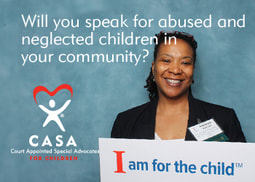Pre-Service Training Starts the week of:
January 4, 2024
February 6, 2024
March 7, 2024
February 6, 2024
March 7, 2024
x
Advocates NeededCASA of the Sabine Neches Region needs volunteers to help with the many fundraising events and community activities throughout the year. Check back here, or click the link below to learn about upcoming volunteer opportunities!
|
In- Person Training Sessions CASA 4.0
Advocate Training |
Advocate Swearing InAs officers of the court, our volunteers ensure that the children’s needs are recognized and best interests are considered both in the courtroom and in the community.
Advocate Swearing In
|







